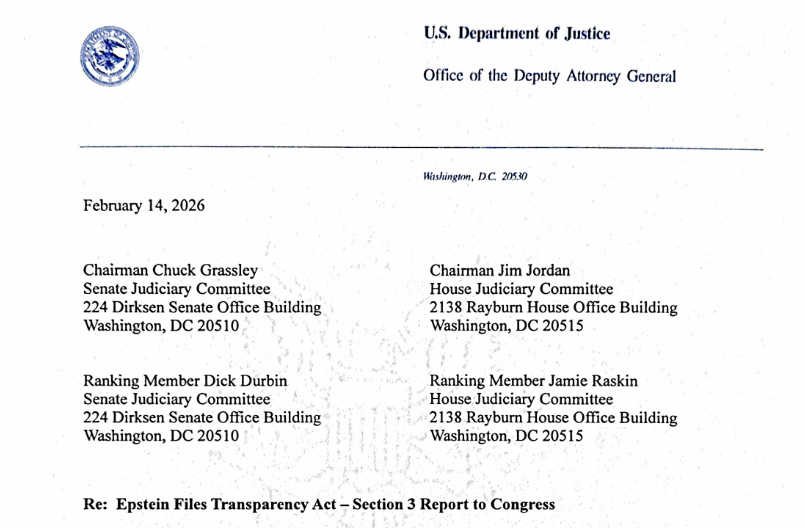Tag: Rule of law
-

Epstein Files Transparency Act — Section 3 Report to Congress
The U.S. Department of Justice informed Congress that it released extensive records related to Jeffrey Epstein and Ghislaine Maxwell under the Epstein Files Transparency Act, withheld only privileged materials, redacted victim-sensitive content, and provided a comprehensive list of government officials and politically exposed persons named in the files.
-

2025 Year-End Report on the Federal Judiciary
Chief Justice John Roberts’ 2025 Year-End Report commemorates the 250th anniversary of the Declaration of Independence by examining its philosophical influence on judicial independence and constitutional law, while providing comprehensive statistics showing federal court filings increased across most categories in fiscal year 2025.
-

Michael Wolff v. Melania Trump Legal Documents Analysis
Journalist Michael Wolff filed a preemptive declaratory judgment action against First Lady Melania Trump after receiving a $1 billion defamation threat over his statements about her alleged connections to Jeffrey Epstein. This comprehensive legal analysis examines the Anti-SLAPP claims, First Amendment defenses, and the high-stakes battle over press freedom and public figure accountability.
-
Critical Evaluation of “The Scandal of the Mar-a-Lago Raid” (Jim Trusty, WSJ)
Jim Trusty’s Wall Street Journal commentary (Dec. 26, 2025) alleges grave misconduct in the Mar-a-Lago documents investigation. Below, we critically evaluate his key claims in five areas, contrasting them with legal precedent and independent analysis.
-
Analysis: “The Scandal of the Mar-a-Lago Raid.”
The opinion piece by Jim Trusty, published in The Wall Street Journal on December 26, 2025, portrays the 2022 FBI raid on Donald Trump’s Mar-a-Lago estate as a “scandal” marked by government overreach, political motivation, and procedural irregularities. Trusty, a former Trump attorney with Justice Department experience, draws on personal involvement and recently disclosed emails…
-
Critical evaluation of Jim Trusty’s Mar-a-Lago claims
Jim Trusty’s December 2025 Wall Street Journal opinion piece contains a mix of technically accurate statements, misleading characterizations, and selectively framed narratives. While some claims have factual foundations, the overall picture presented omits critical context that substantially changes the legal and factual picture. This analysis finds that the majority of Trusty’s claims are either misleading,…
-

Supreme Court Decision: Trump v. Illinois – National Guard Federalization Case
The Supreme Court denied the Trump administration’s request to deploy federalized National Guard troops in Illinois for immigration enforcement, finding the President likely lacked statutory authority. The decision interprets federal law restricting when Guard forces can be called into domestic service.
-

Federal Court Rules U.S. Maintained Custody Over Venezuelan Deportees in El Salvador Prison, Orders Return for Due Process
District Court Chief Judge James Boasberg ruled that 137 Venezuelan nationals hastily removed under the Alien Enemies Act without notice or hearing were denied due process. Despite detention in El Salvador’s CECOT prison, the court found constructive U.S. custody and ordered the government to facilitate their return to challenge deportation designations.
-
Analysis of Richman v. United States: Federal Court Orders Return of Unlawfully Retained Digital Files
In a landmark digital privacy ruling, U.S. District Judge Colleen Kollar-Kotelly ordered the FBI to return electronic files seized from Columbia law professor Daniel Richman, finding the government’s warrantless 2025 search violated the Fourth Amendment. The December 12, 2025 decision addresses critical questions about how long federal law enforcement can retain copies of digital devices…
-
Analysis of Oregon v. Trump: Federal Court Ruling on National Guard Deployment
This is significant constitutional case, raising profound questions about the balance between security and liberty, federal and state power. The court sided decisively with the Founders’ caution about military power, requiring genuine emergency conditions, not mere law enforcement difficulties, before soldiers can be deployed domestically.
-
Comey Argues Vindictive and Selective Prosecution
Seeking to dismiss the government’s case, James Comey argues vindictive prosecution and selective prosecution.
-
Summary of James B. Comey’s Motion to Dismiss Indictment
This motion presents a fascinating challenge to a federal criminal prosecution based on congressional testimony. Let me break down what’s happening here and why the defense believes these charges should be dismissed before trial.